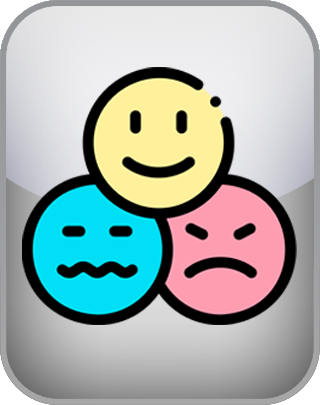Difficulties in Emotion Regulation Test (DERT)
The Difficulties in Emotion Regulation Test, derived from the Difficulties in Emotion Regulation Scale (DERS) developed by Bjureberg and colleagues (2016), serves as a valuable tool for assessing personality traits related to dissociation patterns. This instrument is designed to identify behavioral and emotional patterns that may influence interpersonal interactions, emotional well-being, and daily functioning.
To take the test, enter your input below.
Question 1 of 17
My emotions often become overwhelming and hard to handle.
| Disagree | Agree |
NEXT
The IDRlabs Difficulties in Emotion Regulation Test was developed by IDRlabs, based on the Difficulties in Emotion Regulation Scale (DERS).
Difficulties in emotion regulation refer to challenges in managing and responding to emotional experiences in a controlled and adaptive manner. These difficulties can manifest as intense emotional reactions, problems calming down after being upset, or struggling to recognize and label emotions. Individuals with poor emotion regulation often feel overwhelmed by their feelings, which may lead to impulsive behaviors or inappropriate responses in social and personal settings.
One common feature of emotion regulation difficulties is heightened emotional reactivity. People may experience emotions, such as anger, sadness, or anxiety, more intensely and for longer periods compared to others. This overreaction can interfere with problem-solving and decision-making, as the emotional response often takes precedence over logical reasoning or perspective-taking.
Another challenge is the inability to use effective coping strategies to manage emotions. Instead of engaging in positive behaviors, such as reframing negative thoughts or practicing relaxation techniques, individuals may resort to avoidance, rumination, or self-destructive actions. These maladaptive strategies often perpetuate the problem, exacerbating emotional distress and leading to further difficulties.
Emotion regulation problems are closely linked to interpersonal conflicts. Difficulty in controlling emotions can result in outbursts, withdrawal, or miscommunication, making it harder to maintain healthy relationships. Others may perceive the individual as overly sensitive or unpredictable, leading to feelings of isolation and frustration for both the person and those around them.
To address emotion regulation difficulties, interventions such as mindfulness-based practices, cognitive-behavioral therapy (CBT), or dialectical behavior therapy (DBT) are often recommended. These approaches teach skills like identifying emotions, tolerating distress, and developing adaptive responses. With consistent practice, individuals can improve their ability to manage emotions, enhance their relationships, and build resilience in challenging situations.
As the publishers of this free test, which allows you to screen yourself for emotion regulation difficulties, we have strived to make the test as reliable and valid as possible by subjecting this test to statistical controls and validation. However, free online quizzes such as the present test do not provide professional assessments or recommendations of any kind; the test is provided entirely “as-is.” For more information about any of our online tests and quizzes, please consult our Terms of Service.

